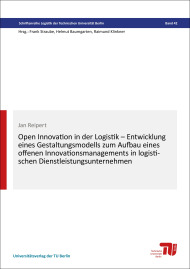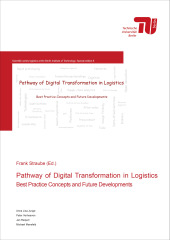Open Innovation in der Logistik – Entwicklung eines Gestaltungsmodells zum Aufbau eines offenen Innovationsmanagements in logistischen Dienstleistungsuntermnehmen

Format: 14,8 x 21,0 cm
Publishing year: 2019
In a world increasingly characterised by globalisation, the efficiency of logistics networks is becoming increasingly important. In order to be able to focus on their core competencies, comapnies largely outsource the necessary services. The high competitive pressure in the market means that competition is often fought out on the basis of price. This price competition is neither ecologically, economically nor socially sustainable and repeatedly leads to dissatisfied employees and negative headlines. The sustainable competitiveness of logistics service providers depends much more on how efficiently they proactively recognize the actual requirements of their customers at an early stage, are able to satisfy them with innovative solutions and thus differentiate themselves in the market. Parallel to these challenges, digitalization means that problems are becoming increasingly interdisciplinary and can only rarely be solved by one company alone. Logistics service providers operate in a comprehensive socio-technical system that accommodates customers from industry and retail, subcontractors, regulatory institutions or IT and technology companies, all of which are necessary for the provision of services, trigger them or significantly influence them. This large number of interfaces, which result from the nature of logistics services, offers enormous potential for cooperative innovation, which have so far only been partially exploited.
The objective of this thesis is to enable logistics service providers to establish innovation management within their company and open it up to the outside world in order to differentiate themselves through innovative services on the market in times of increasingly interdisciplinary challenges. To this end, a holistic design model based on extensive empirical studies will be developed that takes into account strategic, organizational, procedural, cultural and informational aspects. Both qualitative and quantitative methods are applied within the framework of the studies. A close integration of the practice concerned in the sense of application-oriented sciences supports the high practical relevance of the work.



